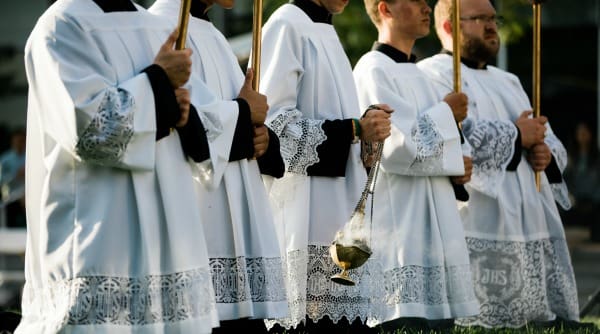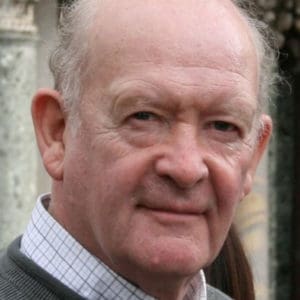MINI-COURSE ON PRAYER
SECTION 2 CHRISTIAN MEDITATION
Part 20 – The Prayer Without Ceasing
Editor’s Note: in part 19, David Torkington discussed the importance of short, fervent prayers said throughout the day. Today he reminds us of the centrality of that perfect prayer: The Holy Mass, and our prayerful participation in it.

The morning offering and its implementation, with which we should always begin our day, is not just a nice pious practice for those who have the time to do it but something on which our ultimate destination depends. It is the place where the whole of the forthcoming day is dedicated to loving God through a continual process of prayer, self-sacrifice and the service of others. In this way all that is said, done and suffered, all that is enjoyed and celebrated is offered in, with, and through Christ to our common Father. This is the new worship “in spirit and in truth” (John 4:24), that Jesus promised to the Samaritan woman. By participating in it we are called to take part in the priestly action of Jesus every moment of every day of our lives
The Whole of Our Life Should Become the Mass
For the early Christians, this daily endeavour was offered together with the daily endeavours of all their brothers and sisters at their weekly Mass. What they received together as they offered all the sacrifices made during the previous week, enabled them to receive all the graces that would sustain them spiritually for the forthcoming week. If we only follow their example then our lives will be irrevocably changed, as we exercise our priesthood every day of our lives. For as the great theologian Karl Rahner once put it:
“The Mass should so form us that the whole of our lives becomes the Mass, the place where we continually offer ourselves through Christ to the Father to receive what we then share with others.”
When this profound and mystical spirituality is practised within the mystical body of Christ by all, from the Pope at the top to the humblest lay person at the bottom, then everyone will be open at all times to the love of the Holy Spirit. ln the early Church when a higher percentage of Christians than at any other time in history were committed to living out this mystical spirituality, their very presence had an enormous influence on the Greco-Roman world in which they lived. The unprecedented example of unbridled selfless charity and all the gifts that charity brings with it converted the ancient pagan world into a Christian world in a comparatively short space of time. The same can be done today. But only the Holy Spirit can do it. It is our privilege to allow him to do it through us, through the quality of our daily prayer life.
Personal Prayer and the Liturgy
If you read the historians and the liturgists of early Christianity who had such an influence on the Second Vatican Council, great emphasis is placed on public liturgical worship. However, this emphasis has often been to the detriment of the personal and daily prayer that enabled the first Christians to participate in the liturgy with such effect. This aspect of early Christian spirituality is regrettably all too often dealt with only as a footnote, or as a brief appendage under the heading of ‘daily devotions of the early Christians’, or some other such title. It is quite evident that before, during and after the Council otherwise well-meaning scholars, theologians, liturgist and historians have failed to grasp the crucial importance of the personal daily spiritual endeavour of ordinary Christian men and women most of all in their daily prayer life. Many have failed to realise that the celebration of the Mass depends for its efficacy on the quality of the personal prayer life of every single individual participant.
A Lesson from Fr. Josef Jungmann S.J.
Let me make my point by quoting from one scholar, who did not make the mistake of many of his peers, perhaps the greatest liturgist of them all, Fr Josef Jungmann SJ, whose words have all too often fallen on deaf ears.
“In the present day liturgical movement, primitive Christianity is often held up before our eyes as a model, an exemplar of liturgical observance. We are to believe that Christians of old, contrary to the tendency of modern individualism, knew no other, or scarcely any other form of prayer than liturgical prayer. Unfortunately, this ideal is not correct. The idea that the life of the primitive Christians revolved exclusively around the liturgy is not correct. And it cannot be correct, simply because it would be unnatural and in contradiction to the Gospels. How could the Christian life exclude private and personal prayer? It is a gross exaggeration to restrict the prayer of Christian antiquity to liturgical prayer alone.”
It is the quality of the spirituality and most particularly of the personal prayer life of the participants, before they even enter the church on Sunday, that makes the Mass what it is supposed to be. It is this that animates it, brings it to life, and brings it to perfection in, with and through Christ who presides over it. If Mass is said without all involved being animated and inspired by deep personal prayer it will never become much more than an empty performance. When I was a small boy during the Second World War, I remember the sirens going off shortly after the Mass had begun. The priest simply carried on, nor did the people rush to the shelters despite the sound of bombs dropping all around us. It was the most intense and prayerful Mass that I have ever attended. Everybody prayed in those days before, during and after the Mass. Do we need another world war to fill us once more with the ‘Faith of our Fathers’? The following Sunday the Parish priest said that the imminent threat of death enabled us all to experience the Mass as our forebears had experienced it in penal times when at any moment priest and people could be carried off to their death by secret agents of the King or Queen.
A Lesson from St. Justin
The same was true for the first Christians when the Mass that we can take so easily for granted could mean imprisonment, torture and death for those who took part in it. But nothing could keep them away from offering themselves with their brothers and sisters in, with and through the One, who had given his life for them. The Parish priest went on to explain that when St. Justin was writing about the celebration of the Mass in the second century, he said that when at the end of the Eucharistic prayer, the priest recited, “Through him, with him, in him, in the unity of the Holy Spirit all glory and honour is yours, almighty Father, forever and ever” the Amen of the faithful was so loud that it nearly raised the roof. Their ‘Amen’ was so strong, so loud and so vibrant because the priest was not just summing up the offering that they were making at that Mass, but the offering they had been making with every fibre of their being at every moment of their lives, in and through all they said and did each day during the previous week, long before they entered the church for their Sunday Mass.
The Prayer Without Ceasing
The early Christian liturgy was deeply inspiring, vibrant and spiritually re-energising, not because it was correct in every detail, or verbally faultless, but because it depended on the daily personal prayer of the faithful, and the profound mystical spirituality that it generated. It was this that transformed all and everything they said and did into ‘the prayer without ceasing’. The daily personal spirituality of the first Christians was intense and all-consuming. It contained one vital ingredient on which the whole success of Christianity depended, and still depends. Whether the believers were at prayer, at least intermittently throughout the day, practising regular fasts or serving the poor, they were essentially turning away from self and towards God. They were doing this as they turned to him directly in prayer and indirectly through the neighbour in need, and they never forgot that this charity began at home, nor should we! In doing this they were practising at all times the repentance that St Peter had called upon everyone to practise on the first Pentecost Day, so they could at all times be open to receive the Holy Spirit. This is what they meant and understood by ‘the prayer without ceasing’ that is to be practised every day of the week and offered at the end of that week, in, with and through Christ to our Father in heaven. Amen!
I have now come to the end of the second part of my mini-course on prayer. Before moving on into mystical prayer please listen to my podcast – Retreat Belmont Abbey 2. From Meditation to the beginning of Mystical Contemplation on my website. If you have the time you may also like to listen to the lecture that I gave to the Discalced Carmelites of the English Province at Oxford.
These ideas are developed further in my two major works on prayer – Wisdom from the Western Isles and Wisdom from the Christian Mystics, and Wisdom from Franciscan Italy that show how deep contemplative prayer grows to perfection.
+
Image credit: Grant Whitty on Unsplash




